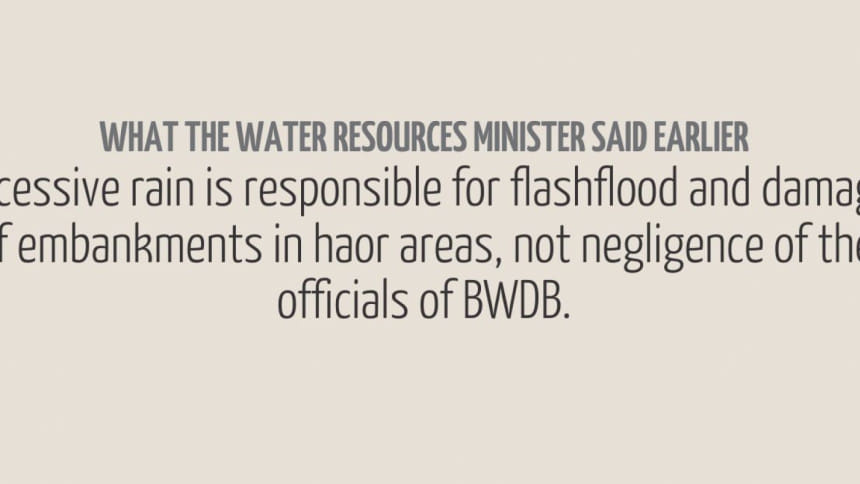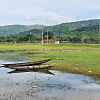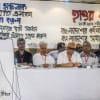Miseries in Haor: Graft, not rain or rats, to blame

Months after flash floods spelt untold miseries for people in the country's haor areas, the Anti-Corruption Commission yesterday sued 61 people, including engineers of Bangladesh Water Development Board and contractors, for purposeful mismanagement and corruption in the construction of dams.
The ACC also arrested suspended BWDB executive engineer Afsar Uddin and contractor Bachhu Mia from the capital's Motijheel area for their alleged involvement in irregularities in constructing embankments in Sunamganj, worst hit by the late-March deluge.
The anti-graft body also asked the government to take stern action against the secretary at the water resources ministry, BWDB director general and 14 other officials for showing “gross negligence in discharging duties”.
The ACC made the move on the basis of its findings in a probe into alleged irregularities in constructing and maintaining dams in haor areas.
The water resources ministry and the BWDB, however, have all along tried to tone down public and media outcry over the alleged irregularities. They rather put the blame on excessive rains and rats for the damage of embankments.
But the ACC findings reinforced the media reports that there had been lots of foul play in construction and maintenance of dams, which should have protected six million haor people from flash floods.
Speaking in parliament on May 30, Water Resources Minister Anisul Islam Mahmud said excessive rain was responsible for flash floods and the damage of embankments in the haor areas, not negligence of BWDB officials.
Thousands of people were affected by the devastating floods in the haor areas of Sunamganj, Netrakona, Sylhet, Moulvibazar and Kishoreganj with nearly three lakh people requiring immediate relief from the government and NGOs.
As embankments got damaged badly, more than two lakh hectares of agricultural land were submerged, causing a loss of nearly a million tonnes of Boro crops.
The flash floods that struck as early as March rendered thousands temporarily homeless with many depending on relief for subsequent weeks for survival.
Yesterday, the ACC filed the case with Sunamganj Sadar Police Station against 61 people, including BWDB's suspended superintendent engineer Nurul Islam and additional chief engineer Abdul Hai, and 12 other officials.
Nurul and Hai along with Afsar were suspended on May 2 over allegations of corruption in building embankments in haor areas.
The other accused are owners and employees of different construction firms.
Earlier on April 12, the anti-graft watchdog formed a five-member committee led by director Mohammad Belal Hossain to probe the corruption allegations.
The investigation found that though BWDB engineers were aware of the possibility of flash floods, they “on purpose didn't begin dam construction work at the right time and abused power for their and others' benefit”, said an ACC official, seeking anonymity.
“They played a role in the destruction of houses, crops, cattle and fisheries by creating scope for corruption to make financial gains.
“Though there is no provision for giving sub-contracts, such malpractice had taken place in some cases.”
Besides, construction work was kept suspended in some cases for a long period in breach of terms of contracts, but the BWDB didn't take any action, the official said.
In 2011, the BWDB took up a project to ward off inundation and improve drainage system for protecting crops from early floods.
Under the project scheduled to end in 2019, the BWDB has so far built 1,500-km long dams in 36 of the country's 87 haors.
The project is being implemented under various packages.
According to the FIR, some construction firms failed to complete work under 84 packages by fiscal 2015-16 but the BWDB didn't cancel their contract or make them pay compensation as per the terms of the contracts. It rather allowed those firms to continue the remaining work in fiscal 2016-17 instead of floating fresh tender.
Four construction firms were awarded nine packages to start building dams by February 28, but they didn't do so.
It also says 45 contractors began construction work under 151 packages within the timeframe but they could complete between 10 and 90 percent of the work until late March when flash floods hit the haor areas.
“It appears that the contractors were waiting for rain or floods so that they could prepare fake bills with the help of dishonest officers of the Water Development Board, and pocket government money,” reads the FIR.
Over the years, there have been allegations of negligence and corruption in building embankments that often fail to give protection from floodwater. This results in inundation of low-lying areas and loss of crops.
The ACC wrote to the water resources ministry in April last year when damaged embankments gave way to floodwater in haor areas. It asked the ministry to investigate the matter and asked it to submit a report in this regard in 10 working days.
The ministry took around a year to come up with a reply. In its letter to the ACC in the last week of February, the ministry said the embankments were damaged by rats that made holes in those.
The commission found the reply unsatisfactory and later summoned BWDB high-ups to quiz them over the late response.
Talking to reporters yesterday, ACC Secretary Abu Md Mustafa Kamal said that if the ministry had taken steps immediately after getting the ACC letter, Sunamganj would not have seen such devastation by flash floods this year.

 For all latest news, follow The Daily Star's Google News channel.
For all latest news, follow The Daily Star's Google News channel. 








Comments